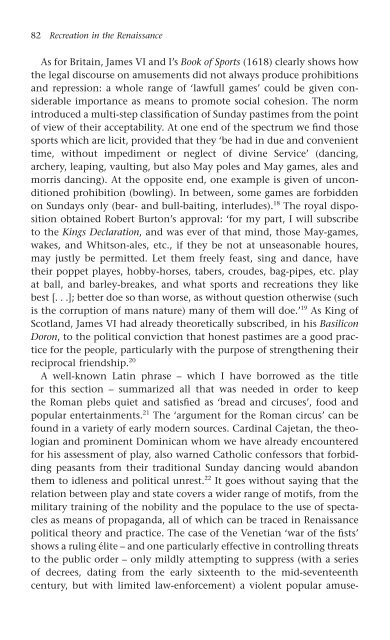Recreation in the Renaissance
Recreation in the Renaissance
Recreation in the Renaissance
- No tags were found...
Create successful ePaper yourself
Turn your PDF publications into a flip-book with our unique Google optimized e-Paper software.
82 <strong>Recreation</strong> <strong>in</strong> <strong>the</strong> <strong>Renaissance</strong><br />
As for Brita<strong>in</strong>, James VI and I’s Book of Sports (1618) clearly shows how<br />
<strong>the</strong> legal discourse on amusements did not always produce prohibitions<br />
and repression: a whole range of ‘lawfull games’ could be given considerable<br />
importance as means to promote social cohesion. The norm<br />
<strong>in</strong>troduced a multi-step classification of Sunday pastimes from <strong>the</strong> po<strong>in</strong>t<br />
of view of <strong>the</strong>ir acceptability. At one end of <strong>the</strong> spectrum we f<strong>in</strong>d those<br />
sports which are licit, provided that <strong>the</strong>y ‘be had <strong>in</strong> due and convenient<br />
time, without impediment or neglect of div<strong>in</strong>e Service’ (danc<strong>in</strong>g,<br />
archery, leap<strong>in</strong>g, vault<strong>in</strong>g, but also May poles and May games, ales and<br />
morris danc<strong>in</strong>g). At <strong>the</strong> opposite end, one example is given of unconditioned<br />
prohibition (bowl<strong>in</strong>g). In between, some games are forbidden<br />
on Sundays only (bear- and bull-bait<strong>in</strong>g, <strong>in</strong>terludes). 18 The royal disposition<br />
obta<strong>in</strong>ed Robert Burton’s approval: ‘for my part, I will subscribe<br />
to <strong>the</strong> K<strong>in</strong>gs Declaration, and was ever of that m<strong>in</strong>d, those May-games,<br />
wakes, and Whitson-ales, etc., if <strong>the</strong>y be not at unseasonable houres,<br />
may justly be permitted. Let <strong>the</strong>m freely feast, s<strong>in</strong>g and dance, have<br />
<strong>the</strong>ir poppet playes, hobby-horses, tabers, croudes, bag-pipes, etc. play<br />
at ball, and barley-breakes, and what sports and recreations <strong>the</strong>y like<br />
best [. . .]; better doe so than worse, as without question o<strong>the</strong>rwise (such<br />
is <strong>the</strong> corruption of mans nature) many of <strong>the</strong>m will doe.’ 19 As K<strong>in</strong>g of<br />
Scotland, James VI had already <strong>the</strong>oretically subscribed, <strong>in</strong> his Basilicon<br />
Doron, to <strong>the</strong> political conviction that honest pastimes are a good practice<br />
for <strong>the</strong> people, particularly with <strong>the</strong> purpose of streng<strong>the</strong>n<strong>in</strong>g <strong>the</strong>ir<br />
reciprocal friendship. 20<br />
A well-known Lat<strong>in</strong> phrase – which I have borrowed as <strong>the</strong> title<br />
for this section – summarized all that was needed <strong>in</strong> order to keep<br />
<strong>the</strong> Roman plebs quiet and satisfied as ‘bread and circuses’, food and<br />
popular enterta<strong>in</strong>ments. 21 The ‘argument for <strong>the</strong> Roman circus’ can be<br />
found <strong>in</strong> a variety of early modern sources. Card<strong>in</strong>al Cajetan, <strong>the</strong> <strong>the</strong>ologian<br />
and prom<strong>in</strong>ent Dom<strong>in</strong>ican whom we have already encountered<br />
for his assessment of play, also warned Catholic confessors that forbidd<strong>in</strong>g<br />
peasants from <strong>the</strong>ir traditional Sunday danc<strong>in</strong>g would abandon<br />
<strong>the</strong>m to idleness and political unrest. 22 It goes without say<strong>in</strong>g that <strong>the</strong><br />
relation between play and state covers a wider range of motifs, from <strong>the</strong><br />
military tra<strong>in</strong><strong>in</strong>g of <strong>the</strong> nobility and <strong>the</strong> populace to <strong>the</strong> use of spectacles<br />
as means of propaganda, all of which can be traced <strong>in</strong> <strong>Renaissance</strong><br />
political <strong>the</strong>ory and practice. The case of <strong>the</strong> Venetian ‘war of <strong>the</strong> fists’<br />
shows a rul<strong>in</strong>g élite – and one particularly effective <strong>in</strong> controll<strong>in</strong>g threats<br />
to <strong>the</strong> public order – only mildly attempt<strong>in</strong>g to suppress (with a series<br />
of decrees, dat<strong>in</strong>g from <strong>the</strong> early sixteenth to <strong>the</strong> mid-seventeenth<br />
century, but with limited law-enforcement) a violent popular amuse-










